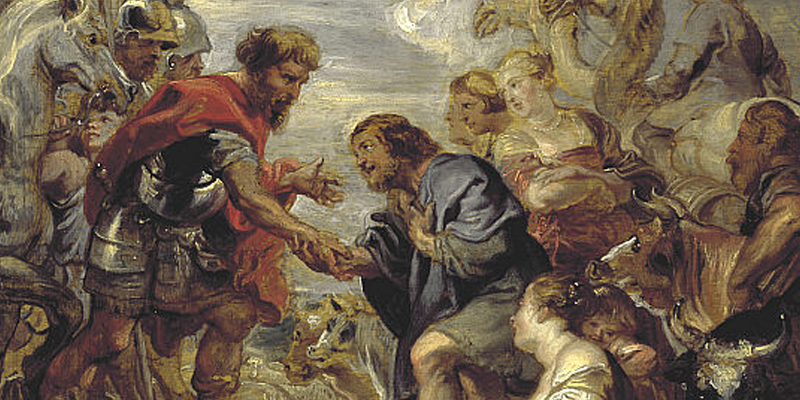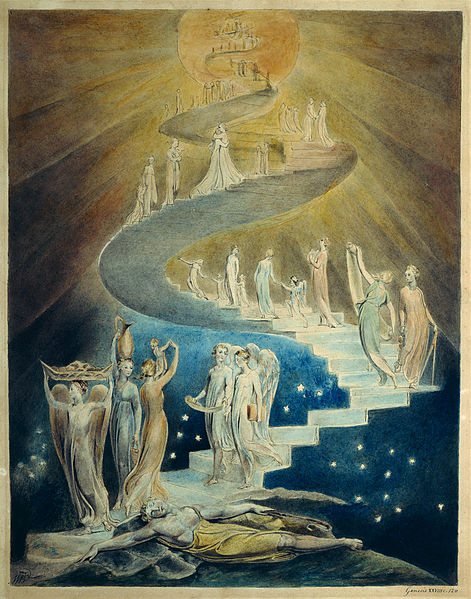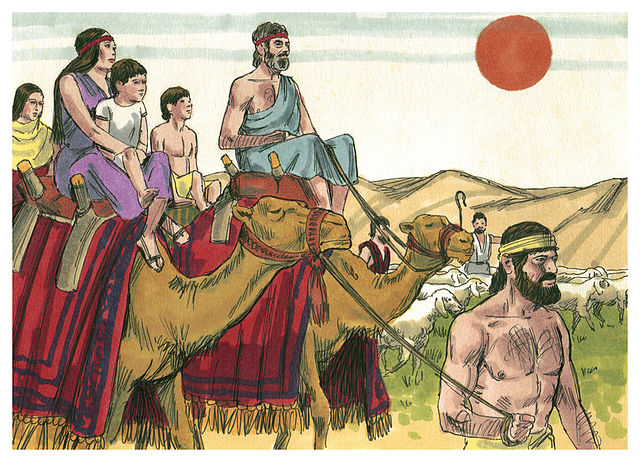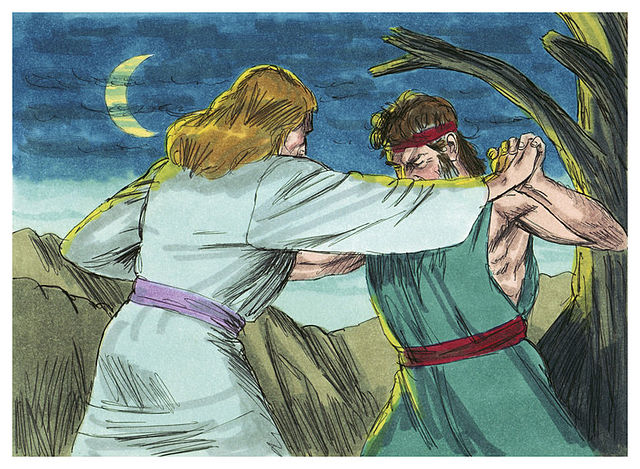Podcast: Play in new window | Download | Embed
Subscribe: Apple Podcasts | Google Podcasts | Spotify | Amazon Music | Android | iHeartRadio | Podchaser | Email | Deezer | RSS | More
The passage in Genesis 33 is an interesting one. It is an account of Jacob’s return to the land God promised to Abraham after sojourning with Laban for 20 years. (Gen 31:41) It seems to me that during all this time, up unto this point, Jacob was riding on the faith of his fathers.
Yes, he had the experience at Bethel on his way to Paddan-Arm (Gen 28:5) where he would meet his wives and make his fortune where he saw God in a vision and the dream of the stairway to heaven. (Gen 28:10-15) God gave him the promise that he would be with him, but even after that, Jacob’s response was one of questioning, and a little uncertainty.
Then Jacob made this vow: “If God will indeed be with me and protect me on this journey, and if he will provide me with food and clothing, 21 and if I return safely to my father’s home, then the LORD will certainly be my God.”
It wasn’t one of “Awesome, let’s go.” He said, “IF God prospers me and does what he said he will do, THEN I will serve him and he will be my God.” (Gen 28:20-21)
Faith is trusting that God will do what he says BEFORE you see the outcome. It is knowing it will come to pass because God said it. Jacob’s response was not faith.
Then you know the story. He went to his uncle, fell in love with his cousin Rachel, worked seven years to earn the right to marry her, was tricked into marrying Leah, and worked an additional seven years for Rachel again. (Gen 29:14-30)
Even though he was family, his status was basically one of a hired hand; he had no personal wealth or resources. Then he bargained with Laban to earn his own flocks and there was the funny business of the spotted and speckled flocks that they agreed would be Jacob’s. (Gen 30:25-33)
After the agreement, Laban took the existing spotted and specked flocks and hid them. Jacob did some manipulating as well. He only bred the strongest ewes to the spotted and speckled rams, and then there was the thing about the striped birch branches in the water when the ewes were mating.
Up Against Impossible Odds
Obviously that was the belief that what the sheep saw when they were mating affected the coat of the lambs. I thought this was odd until I researched the genetics behind the color of a sheep’s coat color.
It is also abundantly clear that Jacob did not have faith that God would bless him, because he felt like he had to make God’s promise come about through his own works (the speckled branches in the water.)
That whole interaction between Laban and Jacob was one of manipulation. Jacob was a good work horse for him and Laban didn’t want to lose him. So he agreed to the terms Jacob suggested that on a solely natural basis, would be set up for him to fail.
The gene that determines spotting is one that, in the most simple terms, says whether spotting will be “on” or “off.” The “on” is a recessive gene. You can read more about it here.[1]
Reading the study of the genetics involved in determining the coat of a sheep made me realize just how much God had a hand in Jacob’s success. The spotting itself is recessive, but Laban even changed the type of spotting pattern that he agreed Jacob could claim. (Gen 31:5-9)
This frustration, this double dealing by Laban, was God training Jacob to put his trust solely in God.
Imagine someone gives a situation where you are set up for failure, but God turned it around, defying the odds of genetics to prosper Jacob. Then Laban sees that and changes the terms, and again God prospers Jacob.
Again and again, and again this happened. Laban changed the terms ten times. (Gen 31:41) Every time God came through.
To understand just how miraculous that was, read that article on coat patterns. God was proving to Jacob that he could trust in him to do what He said He would do.
By the time Jacob was ready to leave for Canaan, there was not a lot of trust between the two men for obvious reasons. He even took Rachel and Leah out in a field to talk to them about it so they wouldn’t be overheard. (Gen 31:4)
They left when Laban was away. When he caught up to them, there was a confrontation between Jacob and Laban. Laban tried to claim credit for everything Jacob had, basically saying, “I made you,” showing a complete lack of appreciation for all of the labor and effort Jacob had put into Laban’s flocks. (Gen 31:22-29)
Jacob said, “I took responsibility for sheep that were lost regardless of the circumstances.” The “hired hand” was bearing the expense of the loss from the flocks that were not his own. (Gen 31:38-39)
Then Jacob said, “You changed my wages ten times, but still God prospered me.” (Gen 31:41)
Did Laban finally get it? Did he recognize how much he had used and taken advantage of Jacob?
No.
They made peace, but even though Laban had received a message from God about it (Gen 31:24,) Laban’s parting shot was “Everything you have came from me, but I’ll let you keep it.” (Gen 31:43-44)
Seeds of Dissension
Going back to Esau, he and Jacob were twins (Gen 25:21-23) and there was a lot of sibling rivalry. Esau was the jock that his father loved best. Rachel loved Jacob because he hung out at home with her. (Gen 25:27-28)
It also sounds like Esau was impetuous and obviously didn’t think through things. He sold his birthright to Jacob for a bowl of stew (some bargain that was.) (Gen 25:29-34) He also compounded his situation by marrying wives his parents didn’t approve of and whom they couldn’t stand. (Gen 26:34-35)
Jacob added salt to the wound by stealing Esau’s blessing through trickery. (Gen 27:1-35)
Then Jacob left town. He followed his parents’ instructions to find a wife from their own people by going to his uncle Laban. (Gen 28:1-2)
This takes us back up to his dream of the stairway to heaven and then the whole saga with his uncle Laban.
So Esau had every reason to have hard feelings towards Jacob. Jacob had maneuvered him out of his birthright and blessing and he didn’t saddle his parents with daughters-in law that they couldn’t stand.
God had told Jacob to go back to Canaan, and he did it. (Gen 31:3) This was also his first show of faith. He was walking back into a situation, where for all he knew; Esau still wanted to kill him. (Gen 27:41)
Jacob prayed to God. He reminded God of his promise to his grandfather Abraham and his father Isaac, as well as the promises God had made to him. (Gen 32:9-12)
Then Jacob prayed, “O God of my grandfather Abraham, and God of my father, Isaac—O LORD, you told me, ‘Return to your own land and to your relatives.’ And you promised me, ‘I will treat you kindly.’ I am not worthy of all the unfailing love and faithfulness you have shown to me, your servant. When I left home and crossed the Jordan River, I owned nothing except a walking stick. Now my household fills two large camps! O LORD, please rescue me from the hand of my brother, Esau. I am afraid that he is coming to attack me, along with my wives and children. But you promised me, ‘I will surely treat you kindly, and I will multiply your descendants until they become as numerous as the sands along the seashore—too many to count.'”
He sent flocks ahead as a peace offering. He divided up his wives and his remaining flocks and wealth into two separate groups, so if one was killed, the other would escape. (Gen 32:6-8)
Then the night before he met Esau, he sent them all out and he stayed alone in the camp. (Gen 32:22-24)
He got alone with God and got real . . . . literally.
And God showed up. (Gen 32:24-32) He wrestled with a man and he would not let go until the man blessed him. Afterwards, he said he had met God face to face. He had come face to face with the Messiah, with Christ who is the visible image of the invisible God (Col 1:15-20, John 1:18, John 6:46, Ex 33:19-23)
After you have wrestled with God, what is a mere man? (Psa 118:6, Heb 13:6, Psa 56:4-6)
When I look back over Jacob’s story, yes he manipulated, but he also was subject to manipulation and tolerated it. He went along with his mother’s scheme for getting Esau’s birthright. His whole stay with Laban was one long string of manipulative situations.
And then he gets ready to face Esau.
Most of the commentary I read about their encounter is one where people say, “Oh, Esau forgave him and was glad to have his brother back.”
I don’t think that is what it was.
Jacob had the birthright and the blessing. He was the head of the family, his father’s heir.
Esau came and wanted to escort Jacob back to Seir. Jacob said the flock and the children were too young and that they would follow along behind at a slower pace and meet him there. (Gen 33:12-16)
But Jacob didn’t go there; they went instead to Succoth and then on to Shechem where they made their home. They didn’t go to Seir at all. (Gen 33:17-20)
Manipulation & Influence
If Jacob had returned to his homeland under the guidance/guard of Esau, that would have given Esau a hand in his return. He would have been able to say, “You wouldn’t have made it back if it weren’t for me” just as Laban tried to tell him that everything Jacob owned was his.
What would Jacob’s position in the community have been if he returned under his brother’s wing, even if it was benevolent? Would he have ever been seen as the leader?
I don’t think so.
This reminded me of a sermon by Robert Morris which touches on the relationship between Jonathan and David. You can watch it in the video below. He sees Jonathan’s actions as motivated by manipulation, one of playing both sides of the fence. If Saul came out on top, Jonathan would be king. (1 Sam 23:15-18) If David prevailed, Jonathan would be #2. (1 Sam 23:17) Jonathan was continually betraying David (Psalm 41:1-13, Psalm 55:1-23,) but David honored his oath all along in spite of it. (1 Sam 18:1-4)
(The part about David and Jonathan starts at the 20 minute mark.)
I think this same motivation was behind Esau’s greeting.
Manipulators Take Credit
One thing I’ve learned about manipulators is that they think that if they have a part in or even just around something, that they can take credit for it all. They think it is all because of them. If they hadn’t been there, it wouldn’t have happened.
This is the other thing about manipulators. They have no true appreciation (further than what they can use) of other people’s gifts and abilities and what they bring to the table.
This is a fact that has taken me a long time to learn. Just as Laban had no appreciation for what Jacob had done for him, if you do something for someone who is under the influence of the spirit of manipulation, it will never be appreciated. . . . EVER.
In that person’s mind, they made/caused you to do it. The possibility that you did it for altruistic reasons will never occur to them.
If you’ve ever had someone jump into a project and make needless changes throwing a wrench in things, it could be because they have no sense, but it is also very possible that they are operating in a spirit of manipulation and control and if they stick their fingers into the pie . . . even if it makes a mess . . . then they can think that they made it happen and the outcome is all because of them.
Another illustration of this is in the book of Nehemiah. Nehemiah has returned to Jerusalem to rebuild the wall. (Neh 1:1-4) There is a lot of political drama and the Samaritans come to him and say that they want to help in the project. (Neh 2:9-10) They say they want to help, but really they want to be involved so they can sabotage it.
Nehemiah tells them, “No, you have no place in this.” They had nothing to do with Jerusalem and he was not going to allow them to gain any sort of authority or right over the city by letting them participate in the rebuilding. (Neh 2:16-20)
Unless, of course, the outcome is a failure. Then they’ll blame it on you just as Laban made Jacob responsible for the losses in the flock.
The same is true of relationships. Have you ever had a friend that had to jump in the middle of every single other friendship you had and then try to make themselves the focal point? And then they think that that entire relationship was only because of them, that they brought it about?
Esau was trying to jump in the middle of Jacob’s blessing.
Standing Firm
Jacob went from getting pulled into manipulative situations continually to standing firm against an attempt by Esau to gain standing through association with him.
If he hadn’t had his encounter with God the night before, I don’t think he would have had the fortitude to withstand the need for acceptance by his brother.
Choose Your Associations Carefully
Jacob’s encounter with Esau illustrates that we have to choose our associations carefully. He moved to another location so that no one could claim credit for his family and accomplishments.
Another illustration of the potential pitfalls of association is the account of Paul and Silas and the slave girl in Philippi in Acts 16. The girl foretold futures and was under the influence of a spirit of divination. (Acts 16:16)
 When Paul and Silas came to town, she went along beside them saying, “These men are servants of the Most High God and they have come to tell you how to be saved.” (Acts 16:17) She was trying to gain credibility by coming along side of them and appearing to be associated with them[2]
When Paul and Silas came to town, she went along beside them saying, “These men are servants of the Most High God and they have come to tell you how to be saved.” (Acts 16:17) She was trying to gain credibility by coming along side of them and appearing to be associated with them[2]
I say “she,” but actually it was the strategy of the demonic spirit that she was under the influence of. That spirit knew Paul and Silas were of God and tried to leverage that God given authority through deceptive manipulation.
This went on until Paul got sick of it and cast the demon out of the girl. (Acts 16:18) (This in turn got them into trouble with her masters because it cost them money. Acts 16:19-24)
Hold Fast to That Which is Good
But it isn’t unbelievers we have to be most careful of. It’s actually fellow Christians that can get us into the most trouble because it’s harder to spot.
In 1 Corinthians 5, Paul talks about this. There had been a big uproar in the church. He had taken them to task because they were tolerating a man in the church who was living in sexual immorality. He told them to “turn him over to Satan” so that he could repent and his soul would be saved. (1 Cor 5:5)
At the end of chapter 5, Paul clarifies how careful we are to be about our associations. (1 Cor 5:9-12) He said:
When I wrote to you before, I told you not to associate with people who indulge in sexual sin. But I wasn’t talking about unbelievers who indulge in sexual sin, or are greedy, or cheat people, or worship idols. You would have to leave this world to avoid people like that. I meant that you are not to associate with anyone who claims to be a believer yet indulges in sexual sin, or is greedy, or worships idols, or is abusive, or is a drunkard, or cheats people. Don’t even eat with such people.
It isn’t my responsibility to judge outsiders, but it certainly is your responsibility to judge those inside the church who are sinning. God will judge those on the outside; but as the Scriptures say, “You must remove the evil person from among you.”
Those are pretty harsh words.
What makes it hard is that, as Christians, we know we are all sinners saved by grace. We all have our warts and blemishes that we are walking out through the sanctification process. The Bible stresses unity and fellowship between believers. We all know this.
What Paul is addressing here is not the everyday mistakes we make. He is talking about when a believer is flagrantly persisting in sin, something contrary to the Holy Spirit, and refuses to even admit that it is wrong and repent.
When someone refuses to examine their own heart and allow the Holy Spirit to convict them of areas in their life that need to be worked out, when they have refused all attempts at correction, then you, as a believer, are instructed to disassociate . . . like Jacob, you need to relocate and remove yourself from the situation.
Sometimes that seems hard hearted. Sometimes those of us with codependent tendencies think that we can fix them, that we can help them see the error of their ways and help them change.
What I have learned through painful experience is that it just doesn’t work that way.
And it doesn’t work that way because, as my pastor says, “It’s a spiritual problem, not an information problem.”
Continuing to reason with them will not work. As Paul says in Ephesians 6:12
For we are not fighting against flesh-and-blood enemies, but against evil rulers and authorities of the unseen world, against mighty powers in this dark world, and against evil spirits in the heavenly places.
If they are a Christian, and they refuse to see it once it has been pointed out to them, it’s because they are being deceived by a demonic spirit. Until they allow the Holy Spirit to convict them to repentance and they are delivered from it, throwing more words at the situation will not help.
It just won’t.
Staying in the situation and in fellowship with them will not help. It will actually make things worse because you are coming into tacit agreement with that spirit and allow it to not only build a stronger stronghold in that person’s life, but in your own life as well.
We are influenced by those we associate with. (Prov 22:24) Even if we don’t start modeling those behaviors ourselves, we become inured to it. If we are constantly around something we know is wrong, eventually it will stop seeming wrong to us. We won’t even notice it anymore.
Our conscience will become seared. (1 Timothy 4:2)
Then we will be in the same position as the person we thought we were going to help and be in need of the intervention of the Holy Spirit ourselves to awaken our conscience again.
All you can do is separate and pray for them.
The Dangers of Tolerating
People like to quote Matthew 18:18 a lot and they usually focus on the binding part. It sounds pretty exciting to go around binding things.
“I tell you the truth, whatever you forbid on earth will be forbidden in heaven, and whatever you permit on earth will be permitted in heaven.”
But most people ignore the second part, “whatever you allow on earth will be allowed in heaven.” If we tolerate things that we know aren’t right, that aren’t in line with God’s will or that is contrary to the fruit of the Holy Spirit . . . we are allowing those spirits contrary to God to gain ground.
God likes good boundaries.
Endnotes
[1] Susan Mongold. Color Genetics in Icelandic Sheep. Tongue River Farms. 2002. Accessed 5-1-2014. http://www.icelandicsheep.com/genetics.html
[2] This insight is not my own; however, I can’t remember where I read this.









 Sometimes spiritual warfare is about setting good boundaries and standing firm. Click to tweet
Sometimes spiritual warfare is about setting good boundaries and standing firm. Click to tweet


